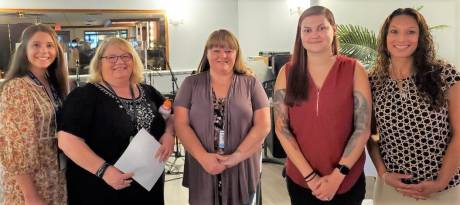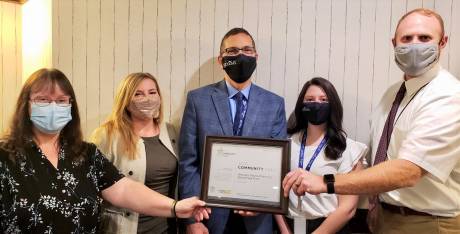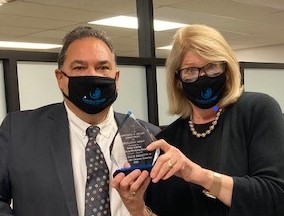Human services agencies working together in effort to reunite women with their children

Women in recovery who are seeking reunification with their children can be encouraged by the networking that exists among provider agencies in Western New York.
That was the message conveyed Thursday at the quarterly meeting of the GOW Opioid Task Force at The Recovery Station on Clinton Street Road in the Town of Batavia.
About 35 people attended the meeting – titled “Parent and Family Resources in Our Communities" -- which was the first in-person gathering for the three-county group since January 2020.
Professionals representing Genesee, Orleans, Wyoming, Erie and Niagara counties spoke about the services offered by their agencies.
“A lot of women who find out that they're pregnant while in medically assisted treatment or in active use are afraid to ask for help because of the stigma that surrounds them,” said Jessica Budzinack, case manager at Genesee/Orleans Council on Alcoholism and Substance Abuse. “So, we decided to develop a plan that has case management, parent/family support, childcare supports and other services to provide a continuum of care for these people.”
Budzinack specializes in services for pregnant and post-partum women, and for those who have had children born with exposure to substances.
MAKING A DIFFERENCE
She said that GCASA has connected with Dr. Davina Moss-King of Positive Direction & Associates in Buffalo, who works with patients and babies suffering from Neonatal Abstinence Syndrome and are in the Neonatal Intensive Care Unit at John R. Oishei Children’s Hospital.
“We have seen that she (Dr. King) was making a difference in Erie County, and we wanted to know what we can do to meet the need in our rural counties,” Budzinack said. “She has trained our team and we implement the positive direction model here at GCASA.”
The positive direction model focuses on accountability and education – giving women the tools to be successful in their recovery and, ultimately, as parents.
Budzinack said she has worked with dozens of women, including many that have an active Child Protective Services case.
“If someone has an open CPS case while pregnant and it is still active when she gives birth, that child also becomes part of that investigation,” she said. “This is to protect the child from the possibility of ‘derivative neglect’ or abuse. The Office of Children and Family Services has a form that I complete with the participants that outlines a plan of safe care – showing all of the programs and services being offered to the parents.”
She said GCASA has provided such services to nine women over the past 10 months, with only one infant having to stay past the five days that New York State requires for observation. None of those babies had to go to the NICU.
“So, we believe we are making a difference by implementing this model here at GCASA,” she added. “A lot of women – and men – are learning how to be a parent all over again, with some having young children who also have experienced the life of addiction and now are recovering themselves.”
CHILDCARE SERVICES AVAILABLE
GCASA offers family relationship peer coaches who provide support in various areas (such as transportation and assistance with the legal system and Department of Social Services) and teach ways for parents and children to communicate with each other, she said.
Additionally, Budzinack mentioned GCASA’s childcare center in Batavia, which operates Monday through Friday, and allows parents to drop off their young children – 8 weeks to 12 years old – up to three hours per day.
“The children are trained in cognitive play – which means that they learn while they play,” she said. “It’s not just a drop-off site where people sit there and stare at the kids until they're ready to get picked up. They actually have a lot of fun.”
The childcare program also offers special activities, such as trips to the zoo or family game nights, through The Recovery Station.
“We all work closely together; we all talk to each other all the time. And we all just look at each individual and see what their needs are, and talk with each other to see how they can be met,” she advised. “It’s all about rebuilding relationships and becoming effective parents while sober.”
Dawn Stone of Spectrum Health & Human Services, a peer specialist providing mentoring services to those in recovery in Wyoming County, said she works across systems to identify effective treatment plans for mothers, fathers and children.
“We work with Hillside Children’s Center, which deals with families with developmental issues, and we also have what’s called Lighthouse Station, where pregnant moms who don’t have a place to stay – and would otherwise be in jail – can deliver their babies in a non-jail setting,” she said. “We also work with other counties to learn about their programs and refer families to when they come to us.”
THRIVING NETWORK IN BUFFALO AREA
One of those agencies is Buffalo-based Caz Recovery, which was represented at the meeting by Angela Angora, director of Reintegration Services, and Morgan King, program manager at Madonna House, a 17-bed rehabilitation facility for women and women with children in Lockport.
Angora, a Genesee County resident, shared that her mother became addicted to crack cocaine in the early 1990s, a time when there weren’t many treatment and recovery programs.
She said things have changed dramatically over the years, noting that Caz Recovery offers Casa Di Vita, a 19-bed reintegration program for women in Buffalo and Somerset House, a 17-bed reintegration program in Appleton.
“We do accept women that are pregnant, however, they would have to come back with the baby here,” she said. “With this program, the women have more autonomy, they're able to go out into the community and they have community time for visits with their family.”
At each location, Caz Recovery staff provide specialized services to help women get their lives back in order and reach the point of reuniting with their children and learning parenting skills, she said.
“After individuals complete our rehabilitation program, our community residences – congregate settings – focus on volunteering, job placement and outpatient counseling, and they receive their services off site,” Angora added. “This is where you will see a greater focus on that family involvement.”
Caz Recovery also offers supportive living, with 40 beds in Erie County and 14 beds in Niagara County, serving women and men with children, as well as a housing program for families ready for that important step, she said.
BIG PLANS FOR ORLEANS COUNTY
Shannon Ford, GCASA’s director of Communications & Development, shared that the local agency will be opening a women’s residence in Orleans County next year.
“We’re hoping to have a lot of those same kind of services available for women in our rural communities,” she said. “Currently, we work with Spectrum to help those in Wyoming County coming into our residential programs, but we have not been able to offer anything specifically for women and children to this kind of level.
“So, we’re extremely excited to model our programs after that. And I'm very grateful that GCASA has been able to make referrals over many years to Madonna House.”
For more about programs for women and children in this area, contact Budzinack at 585-813-8583 or at jbudzinack@gcasa.org.
Photo: Speakers at the recent meeting of the GOW Opioid Task Force are, from left, Christen Foley, task force coordinator; Dawn Stone of Spectrum Health & Human Services, Jessica Budzinack of GCASA, and Morgan King and Angela Angora of Caz Recovery.
Disclosure: Mike Pettinella is the publicist for GCASA.


